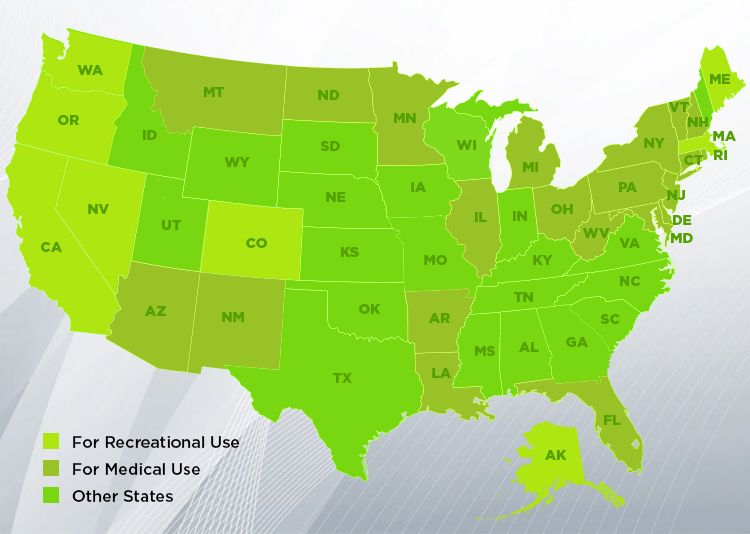This is a very exciting time for cannabis around the world as cannabis policy reform is making more significant advancements than ever before.
Things really started to change during 2011 and when both, Colorado and Washington states voted for legal adult use cannabis in November 2012, the progress had become real.
As we’ve just passed the 5th anniversary of this historical event in those two pioneer states, it is worth looking at how much progress has been made during these last 5 years.
Colorado was first to ‘go live’ with adult use marijuana sales on January 1, 2014, to become the first state with regulated and taxed legal adult use cannabis sales.

Since then, annual sales have exceeded US$ 1 billion in Colorado and the state has collected over half a billion dollar in taxes from cannabis sales since 2014.
A growing number of other states have gone down the same path and made adult use cannabis use legal within their state borders as support for cannabis among the American public is reaching record highs.
The latest Gallup poll showed that a higher than ever number, 64% of Americans support legalizing marijuana in the US.
It makes perfect economic and social sense. Public data coming out of the already legal states shows a wide range of positive impacts, such as more employment and boost to local economies. House prices keep up and grow more in states with legal cannabis, while violent crime tends to go down.
Negative effects that anti-cannabis campaigners worried about, did not materialize. Legal cannabis has not led to increase in traffic accidents, nor has it encouraged more kids to use cannabis.

It is hard to find a legitimate problem with cannabis legalization and it is completely understandable that more and more states are keen to join the green rush.
It does not mean that the fast-growing cannabis movement does not face difficulties. They surely do, however, all of those are due to federal prohibition and not to cannabis itself.
Banking or rather the lack of it, due to banks in the US are being regulated federally is a huge issue for example that we covered here in Greendorphin previously.
The Trump administration’s position on cannabis seems to be dictated by Attorney General Jeff Sessions, who is no friend to cannabis and does everything he can to bring back outdated and myth busted propaganda and restart the war on cannabis.
This is obviously taking effect on the progress of cannabis law reform in the US, as the Maine governor has just vetoed the state’s bill that was meant to regulate the sales and taxation of adult-use cannabis.
The progress in the US has taken a step back by the change in government, however, it has already started an international movement for change that Jeff Sessions has significantly less control over.

Uruguay has become the first country in July this year to regulate the sales and taxation of cannabis nationwide.
Uruguay is a small country with less than 4 million people, however, it is a significant and historical move that we have never seen in our lifetime.
The American federal government is trying to place banking limitation on Uruguayan entities as well, in a similar way they do in the US. Hopefully, with some resilience and time, it can be overcome.
Canada is lined up to become the first developed nation to regulate and tax a legal cannabis industry from mid next year.
The surprise change in government in New Zealand has resulted in a promise for a referendum on adult use cannabis by 2020.
Despite the setback in progress in the US on the federal level, California will be kicking off its adult use cannabis market from January 1 next year and it is estimated to grow to US$ 7 billion annually in a few years time.
Massachusetts is also lined up to start legal adult use cannabis sales during next year sometime.

If the federal government doesn’t change its outdated cannabis policy, cannabis businesses in the US will continue to face significant hurdles just to do business and all those hurdles will surely add up when we are talking about a $7 billion market.
Acceptance of cannabis is increasing rapidly around the world as information is freely available and people can’t be simply brainwashed with a Reefer Madness-style TV ad campaign anymore.
The economic and social cost of keeping up the failed war on cannabis is becoming too large, while at the same time people are learning the truth about the health benefits of cannabis. Hopefully, in another 5 years, cannabis will be legally available to everyone around the world.
It will never be forgotten that the real action was started by these two states voting ‘yes’ for legal weed and going through the overwhelming tasks of working everything out from scratch.
Every other state, as well as Uruguay and Canada, have been able to draw inspiration and ideas from the experiments of Colorado and Washington, study what works and what needs improvement, so they don’t have to go through the whole learning curve.
Share your views in the comments below.
- Nimbin Medican – Educating Australians About Medical Cannabis - January 28, 2020
- Pill Testing and Roadside Drug Testing – When is it Appropriate to Test for Drugs? - August 2, 2019
- The Australian Cannabis Summit in Review - July 16, 2019


